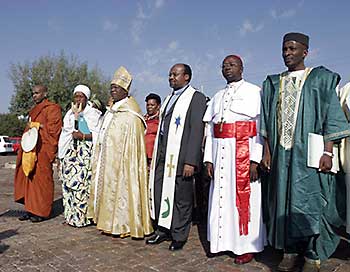
South Africa is a hybrid legal jurisdiction, historically blending Roman-Dutch civil law and English common law. Dutch settlers occupied South Africa in the mid-seventeenth century, and Roman law, as interpreted by Dutch writers, was the primary source of law. The British defeated the Dutch settlers in the early nineteenth century, and while they did not initially replace Roman-Dutch law, in certain areas English law dominated procedure. For many years, the legal system blended the two systems, with customary law also available for indigenous people to regulate certain matters like marriage. However, since the enactment of the 1996 Constitution, the Judiciary has ruled that South Africa is a Constitutional State and that the Constitution is the highest law of the land and any law in conflict therewith is invalid. This has led to the demise of the Roman-Dutch system. In South Africa, common law is precedent.
South Africa is a religiously diverse society; approximately eighty percent of the population is Christian, sixteen percent decline to indicate an affiliation (it is possible that they belong to unaffiliated indigenous religions) or are not religious, and four percent is Hindu, Muslim, Jewish, Buddhist, or adhere to traditional African beliefs. Most Christians are members of African Independent Churches, and others are members of other denominations, including Protestant, Pentecostal, Roman Catholic, Greek Orthodox, Seventh-day Adventist, and The Church of Jesus Christ of Latter-day Saints. During apartheid, there was a close relationship between the Dutch Reformed Church and the Nationalist party, and many policies were justified in the name of religion. South Africa is now a secular state where no religion is favored over another.
Religious freedom is generally protected in South Africa, though there are few instances of structural discrimination. It is a democracy, with mostly peaceful transitions in power; however, corruption diminishes some respect for the law. While the government created agencies to combat corruption, enforcement is weak due to inadequate structures and staff. Similarly, there is some difficulty in enforcing statutes regarding religious freedom, and passing relevant new legislation.
A Bill of Rights is incorporated into the 1996 Constitution, and the Constitution provides for the freedom of religion in several sections. The Constitution is not the only source of protection for religious freedoms. While the Constitution does not explicitly guarantee the right to proselytize or to discriminate on religious bases in hiring practices, these rights may be protected by international treaties or other human rights norms. South Africa is a signatory to the Universal Declaration of Human Rights (UDHR), the International Compact on Civil and Political Rights (ICCPR), and the African Charter on Human Rights (ACHR). Sections 231-33 of the Constitution make provisions for adopting international legal norms into South African law.